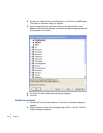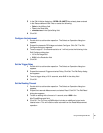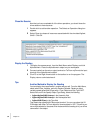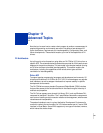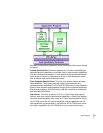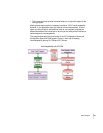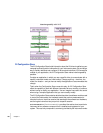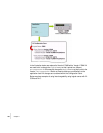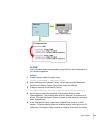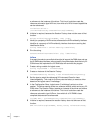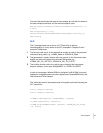
104
Chapter 11
•
•
•
•
•
•
capabilities, it is called an IVI-COM custom driver. If the driver includes the class
capabilities, it is called an IVI-COM Class Compliant driver. IVI-COM Class
Compliant drivers may or may not include custom capabilities.
Instrument I/O
All IVI drivers communicate to the instrument hardware through an I/O Library. The
VISA library is typically used because it provides uniform access to GPIB, RS-232,
USB-TMC and LAN instrument. Drivers that communicate with insruments that
only use RS-232 or LAN occasionally include their own I/O that does not require
VISA.
Shared Components
IVI Foundation members have cooperated to provide common software
components, called IVI Shared Components, that ensure compatibility among
drivers from various manufacturers. These components provide services to drivers
and driver clients that need to be common to all drivers.
IVI Configuration Server
: This component is the run-time module responsible for
providing configuration data to IVI drivers. The Configuration Server specifically
provides system initialization and configuration information.
COM Session Factory:
This component can dynamically load an IVI-COM
software module without requiring the application program to identify the IVI
software module when it is compiled. This allows the test program source code to
have all references to a specific instrument removed. This capability is provided in
IVI-C using an IVI-C Class driver.
Interchangeability
One aspect of the IVI standard is instrument interchangeability, which allows you
to write and compile your program for an instrument from one manufacturer and
then swap it out for the same type of instrument from another manufacturer. After
making changes to a configuration file on your computer to identify the new
instrument (and driver) and the hardware address (if that changes), you can run
your program without modifying or recompiling it. That’s in an ideal world, of
course.
The minimum necessary requirements for interchangeability include the following:
•
Drivers for both instruments must be of the same type (IVI-C or IVI-COM);
•
Both drivers must implement the same instrument class. For example, both
must conform to the requirements for IviDmm or IviScope;
•
For IVI-C, your program must use a Class Driver, which in turn instantiates the
Class Compliant Specific Driver and calls class compliant functions in it.
•
Your program calls only those Class Extension functions supported by both
drivers.
•
Your program never calls Instrument Specific functions.



